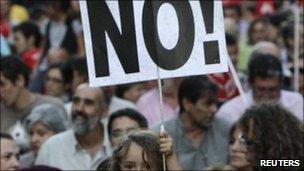Spain passes tobacco tax increase
- Published

Proposed austerity measures have led to protests in Spain
Spain's government has raised the tax rate on tobacco as it seeks to tackle its high budget deficit.
It is part of a package of measures to increase income and cut costs, and calm market fears over government finances.
Madrid has also announced plans to sell off 30% of the Spanish national lottery and a minority stake in the country's airport authority.
The government expects to raise an extra 780m euros (£663m; $1.04bn) a year through the tax rise.
Spain's budget deficit hit 11.1% of GDP last year, and the government has pledged to cut it to 6% in 2011
Meanwhile the country's cost of financing has risen to record highs in recent days on worries that, like Greece and the Irish Republic, it could need an EU bail-out.
Rushed measure
Prime Minister Jose Luis Rodriguez Zapatero cancelled a trip to a summit in Argentina to be present for a cabinet meeting on Friday, where the "anti-crisis" measures were approved by decree.
First mentioned only on Wednesday in a reply to a question in parliament, the reforms are a rapid response to a record rise in government borrowing costs.
"These steps were taken under pressure, and my impression is they're not the last we'll see," says economist Pedro Shwartz, in Madrid.
"These are willy-nilly measures, in reaction to the markets. What the government needs is a systematic and large package of reforms. I don't think Spain is out of danger yet."
The tax on tobacco will rise 28%. That will be unpopular with smokers, already facing a ban on lighting-up in enclosed public places from January.
But the economy minister argued the move would reduce consumption and improve public health, as well as raising additional revenue.
Benefit cut
In addition, the government will discontinue payment of a 426 euro monthly subsidy for the long-term unemployed.
The extra funding was introduced last year when the recession showed no sign of easing, for those whose other benefits had already run out.
The collapse of the construction market has left more than 4.7 million people in Spain without work.
On Friday, the Bank of Spain revealed that 40% of them live in households with no income at all.
At 20%, the Spanish unemployment rate is the highest in the European Union.
'Under pressure'
"The government has to press ahead with reforms, even though they go against its electorate. It is paying a very high cost for this, politically," believes Rafael Pampillon, economist at San Pablo-Ceu University.
"If they don't do this, then borrowing costs will rise and Spain would be forced into accepting a bailout like Ireland.
"I don't know what's worse for a government's prestige: changing policy under pressure, or having the EU and IMF intervene directly and take over."
The reforms also include measures to stimulate economic activity and improve competitiveness in Spain, such as an expansion of tax cuts for small and medium sized companies, and measures to make it easier to set up new firms.
But the latest moves come as new figures show Spanish industrial production fell for the second consecutive month in October.
The drop was due largely to a reduction in the output of consumer durable goods, official data showed Friday.
Output declined 1.9% from the same month last year, after falling 1.6% in September, the National Statistics Institute (INE) said.
Last month, official figures showed that Spain's economy did not expand between July and September compared with the previous three months.